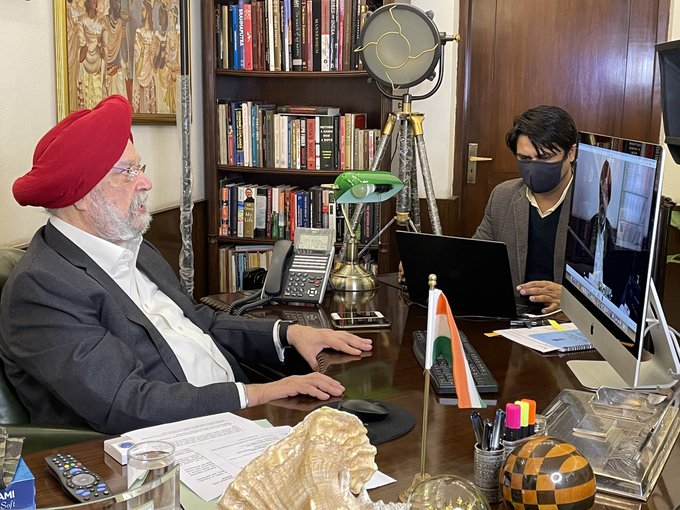12th GRIHA summit inaugurated
New Delhi: Hardeep Singh Puri, MoS, I/C, Housing and Urban Affairs has stated that a holistic approach is required, that ensures a balance, to achieve India’s development goals while keeping sustainability at its core. Speaking at the inaugural session of 12th GRIHA Virtual Summit in New Delhi today, Shri Puri said that when an individual enters a GRIHA certified building, one feels a strong sense of respect, understanding and motivation behind the architectural design. He added that the ecosystem for sustainability and sanitation these buildings provide, inspire behavioural change. The theme of the 12th GRIHA Virtual Summit is ‘Rejuvenating Resilient Habitats’. Hon’ble Vice President of India Shri Venkaiah Naidu launched the SHASHWAT magazine and the book ’30 Stories Beyond Buildings’ during the event, documenting the extensive collaboration between GRIHA Council and the Public Works Department, Government of Maharashtra. President Griha Council and Director General of TERI Dr Ajay Mathur, and other participants were present in the virtual summit.
Shri Puri appreciated Green Rating for Integrated Habitat Assessment (GRIHA) Council for organising the virtual summit to engage with all relevant stakeholders. He said that deliberations held during this summit will enable knowledge sharing and encourage the development of green and sustainable habitats across the country. He added that Government of India recognises the imperative of and accords the highest priority to environmental preservation and countering climate change as essential areas of focus for our nation and planet. Speaking on growing urbanisation, Shri Hardeep Singh Puri said that the urban infrastructure should provide essential services to our citizens while also being able to deal with the magnitude of demographic shifts taking place, sustainably.
The Minister stressed that cities bear a massive responsibility for balancing the needs of the present with the requirements of future generations, to maintain a sustainable equilibrium and to diminish the adverse effects of growing urbanisation on the environment. “This period of pandemic has proven how world-class smart infrastructure in our cities can help us respond to unpredictable externalities. The Government has taken up various measures for adopting construction technology reforms in the housing and real estate sector. The Ministry of Housing and Urban Affairs had organised Global Housing Technology Challenge India (GHTC-India) in January 2019 which aimed to identify and mainstream best available and proven construction technologies that are sustainable, green and disaster-resilient to enable a paradigm shift in housing construction”, he added. The Minister informed that as a part of Construction Technology Year (2019-2020), six innovative technologies have been selected from 54 proven technologies that participated in GHTC-India for constructing 6 Light House Projects (LHPs). He added that about 1,000 houses each will be built with allied infrastructure facilities at six places in different technical regions, namely Indore (Madhya Pradesh), Rajkot (Gujarat), Chennai (Tamil Nadu), Ranchi (Jharkhand), Agartala (Tripura) and Lucknow (Uttar Pradesh). He further stated that through the Affordable Sustainable Housing Accelerators – India (ASHA-India) initiative, five Incubation Centers have been set up for identifying innovative materials, processes and technology for resource-efficient, resilient and sustainable construction.
Speaking on resource availability in India, Housing Minister said that India has no shortage of coastline and rivers but India needs a very comprehensive strategy to recycle, reuse and treat water. He added that Green Buildings will be essential in ensuring we don’t overuse our resources to the point of crippling shortage in the years ahead. He further said that Green Buildings can address 9 of the 17 Sustainable Development Goals (SDGs). He congratulated GRIHA on the launch of GRIHA 2019, the upgraded version of GRIHA Council’s rating system which strives to align our efforts more closely with the SDGs. Shri Puri said that Hon’ble Prime Minister Narendra Modi’s flagship urban development programmes have proven to be game-changers. He added that -19 pandemic has presented the need for social distancing and health security norms to be practiced while moving through the city and accessing essential services. He further said that our cities are now reimagining their streets as public spaces through the lens of economic regeneration, safety and child-friendly interventions to ensure a green recovery from COVID-19. The recently launched Climate-Smart Cities Assessment Framework (CSCAF) 2.0 and ‘the Streets for People Challenge’ aim to make our cities people-centric, pedestrian-friendly and climate-resilient.
Shri Puri said that Swachh Bharat Mission has generated and sustained behavioural change for sanitation and hygiene in people through programmatic interventions and citizen-led networks. He added that Smart Cities Mission is working towards integrated and comprehensive development of cities. Shri Puri informed that as part of the Covid-19 response, 47 Integrated Command and Control Centres (ICCC) created under the Smart Cities Mission are serving as crisis management war rooms helping monitor the on-ground situation while leveraging various technological innovations like geospatial mapping and telemedicine services.

